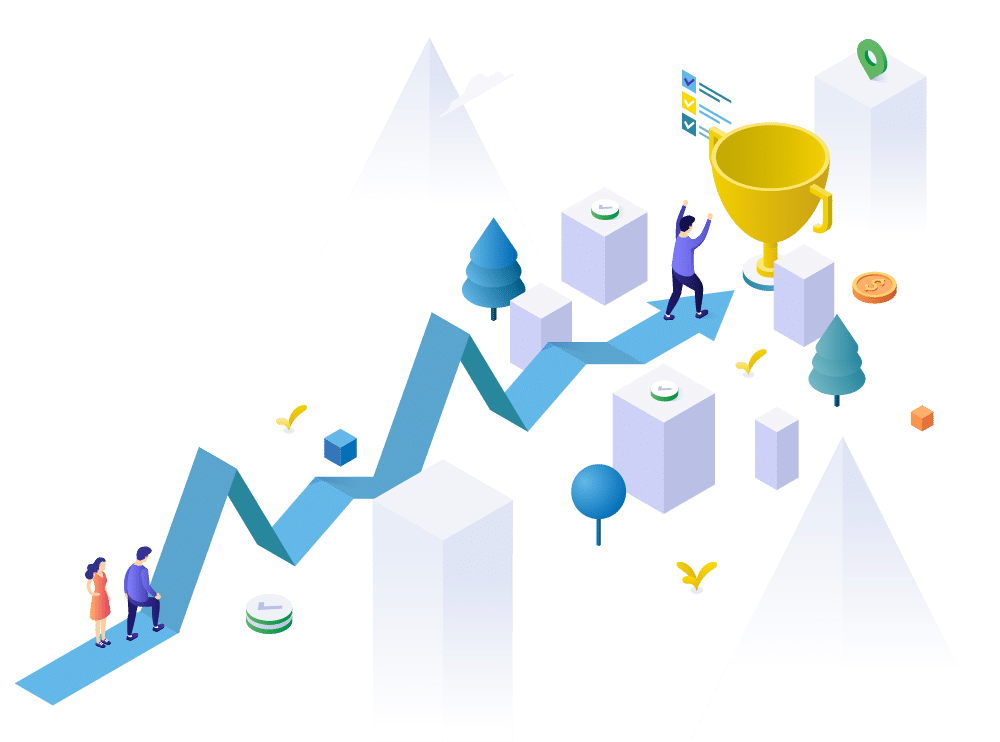I’m sure you've heard of projects before...haven't we all. Projects are incredibly helpful at teaching us things, whether it's baking a cake for the first time or building a coffee table. Projects come in all shapes and sizes. A project could be as large as creating a new state highway system or as small as cleaning out your pantry!
At Qwasar, projects are the foundation of our approach to learning: we are truly project-based. Our curriculum is focused on learning by doing, meaning learners are better able to analyze and retain the information they are learning in each project. Project-based learning is based on an understanding of how we learn as humans, how we develop skills, and each person's learning journey to mastering different capabilities and tools.
What is Project-based Learning?
Project-based learning (PBL) is defined as “a teaching method in which students learn by actively engaging in real-world and personally meaningful projects.” (PBLworks.org) This method allows students to showcase their true knowledge by performing real projects. Students develop an extensive array of content knowledge that can be applied in the real world as well as skills and confidence through practice and hands-on experience.
With a PBL approach, students significantly lessen their dependence on an instructor or teacher for knowledge and to have their questions answered; instead, learners take more problem-solving into their own hands by analysis and trial and error. In today's world, knowledge is accessible: you can look up just about anything on Google. What's important today isn't having a person deliver knowledge, but instead the importance lies in developing critical thinking skills, doing your own research and evaluating and solving complex problems.
PBL as method of learning enables students to develop their skills to an 'automatic' level where what they have done, how they've done it, and improvements become a natural part of their work. Just like a sports player learning a new move, with practice and improvement, it becomes more natural for them. Skill development is hard, and it takes time, practice, and motivation, things that are all part of the learning journey here at Qwasar. The self-learning approach at Qwasar includes individual development, check-in’s, reviews, and individual accountability. This accountability comes in the form of daily or weekly team check-in’s to report on your progress for your individual project. You are only going to be as successful as you want to be!
Project-based Learning is at the core of Qwasar and it sets us apart from other learning programs. We are committed and driven to this style of learning because we are utterly convinced that not only does this method work, but it is exactly what is required to train people for 21st-century jobs and ongoing career success.

Examples of Project-based Learning
Project-based Learning involves actively creating, evaluating, and analyzing. You work on projects that involve creating a solution at the end. You incorporate the engagement component through building, testing, fixing, and trial and error. The entire experience is very different from sitting in a classroom or watching a video lecture.
Learners will choose the design of and structure their code, algorithms and functions. They will actively engage in research, analysis, trial and error, and using resources to get to their final solution. As you progress through the projects, they become increasingly more difficulty and larger in size as more and more skills are developed.
Some examples of PBL questions used by facilitators for learners:
- Draw the relationship between ___ and ___.
- How does ___ affect ___?
- What is an example of ___ that explains ___?
- What kind of models could I use to explain ___?
- Do you think there is another or better way of doing ___?
- What conclusion can you draw about ___?
As you can see, the style of these questions is meant to foster a deeper understanding of exactly WHY and HOW you are learning a certain topic.

What Project-based Learning is NOT
I’m sure you have done projects before, but it's important to remember that you are not necessarily experiencing project-based learning every time you are assigned a project. Many programs think they are using PBL methods, but in actuality they are far from it.
You need to recognize what is project-based learning but also what isn’t PBL. When you have a collection of lectures from an instructor, that is not project based learning because projects are not the fundamental medium for learning. When you are listening to a few lectures then doing a project or two, that is also not project-based learning. This is often referred to as a practice of “dessert projects." Dessert projects are the short, easy projects given after a lecture, but they do not allow for true skill development, how to learn on your own, critical thinking and structured problem-solving, or experiencing the project lifecycle similar to what you'd do in a job. Being able to remember or recite information will never teach you the innate and crucial skills of learning.
Benefits of Project-based Learning
For learners, there are significant benefits from the PBL method. This style of learning can lead to a greater understanding of the fundamental knowledge of the concepts you are learning and ultimately improve your job prospects.
With PBL, you are truly learning on your own the skills you will need to be successful in future jobs. From the practice and projects you performed on your own, you gain hard skills and soft skills as well as technical knowledge required for jobs in software. Data structures and algorithms, for example, are not topics that you heard once in a lecture and forgot about. At Qwasar, you are learn and experience things such as data structures and algorithms such that not only do you meet the job requirements, but you also have the confidence and experience to talk about subject-matter areas in interviews. This will make you a better candidate and set you apart from other students who may have only done a bootcamp or a MOOC. The Qwasar learning approach is not incorporated in the vast majority of other programs.
Most importantly, the PBL method fosters a love of learning in students. This approach enables students to enjoy what they are learning and make them want to do and learn more. With PBL, students are far more engaged in their work.
.png)
What to Expect From a Project-based Learning Program
Our programs are designed with the PBL approach in order to extract the most benefit for learners. It is one of the many ways that our program differs from other options and a major indicator of why our students go on to work for incredible companies not just when they graduate, but also 1-2 years into their careers.
Expect a more challenging way of learning than lectures, online videos, or small projects. Trial and error can be frustrating but also exhilarating when you succeed. Researching, analyzing, and building solutions, writing code and making decisions, are more involved and tiring than knowledge delivery. You'll use more brain power and deep thinking. Sometimes, you will work as a team and collaborate with others, which requires greater coordination, discussion, and critical thinking than lectures. Group projects helps you communicate and develop collaboration skills as part of a team. The energy is fun and creative and inspires students to want to keep going and keep learning. The culture derived in this program includes openness, independence, team spirit, inquiry, growth, quality, and communication. Undoubtedly, PBL is more fun, but it's also more challenging.
At Qwasar, students are encouraged to share what they are learning through daily check-in’s. They are also encouraged to assist one another in areas they have already mastered. We have facilitators who serve as mentors to point learners in the right direction, but you are truly responsible for your own learning.
The active learning model at Qwasar features project-based learning, peer reviews, gamification, and role play. As you go through this program, you gain more and more independence as your knowledge grows. The projects will get longer and more complex as your skills grow.
With most things in life, we learn the most by doing and also when things don't work or we fail. While there can be frustration when things don't work, these are the moments when we learn the most, and those are also the moments that we here at Qwasar want you to experience with us first, and not with your employer. You have a leg up if you've already experienced project-based work, the software development cycle, and how to handle the personal side of working on projects.
We hope you'll join our community and programs, embracing the PBL experience and taking confidence that skill development is tough but 100% worth it.


